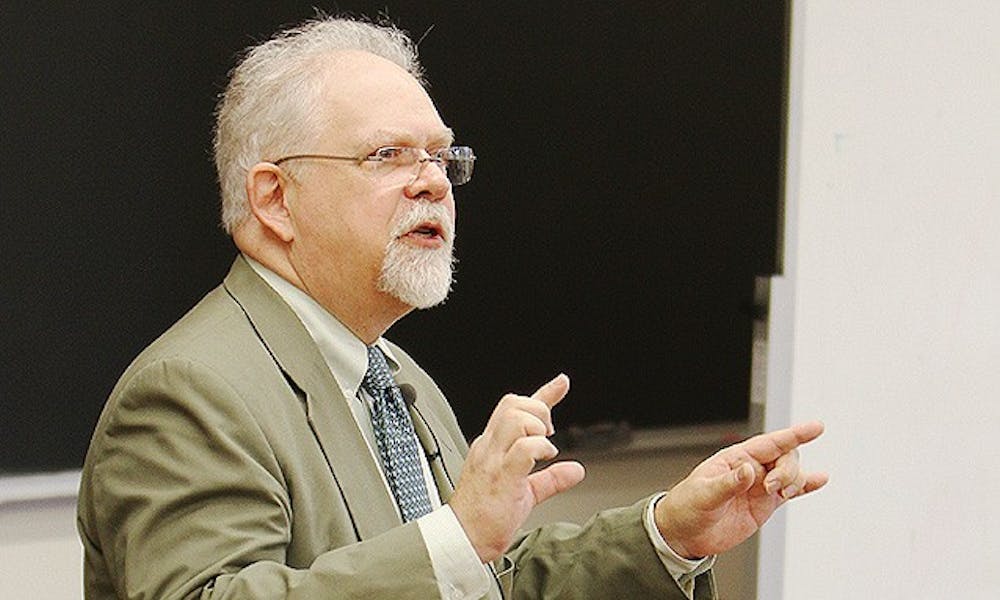Western society should value the connections and similarities it has to Islamic society instead of approaching it with hostility, said Richard Bulliet, professor of history at Columbia University.
Bulliet challenged the belief that there is a boundary between Christian and Islamic cultures at a forum Monday titled “The Case for Islamo-Christian Civilization.” The forum was sponsored by the Duke Islamic Studies Center and the Duke University Middle East Studies Center. In his speech, Bulliet emphasized that Western cultures have benefited from extensive cultural exchanges throughout history.
“When you get up, you brush your teeth, but the tooth brush was invented by Arabians,” Bulliet said. “You have breakfast, but it was Arabians who invented orange juice. You read newspapers, but paper was introduced to Europeans by Arabians.”
Bulliet, who specializes in Islamic history, published a book in 2004—also titled “The Case for Islamo-Christian Civilization”—in which he analyzes the comparative cultures. He said he had hoped his concept would spread, but an unfavorable recent history between Western and Islamic cultures—most importantly 9/11—has prevented its popularity. He noted that the Jewish-Christian connection is widely recognized because of the relationship between the United States and Israel.
“When I read his manuscript of ‘The Case for Islamo-Christian Civilization,’ I predicted that the term would be a household word soon, but unfortunately my prediction proves to be wrong,” said introductory speaker Bruce Lawrence, Nancy and Jeffrey Marcus professor emeritus of religion at Duke.
Geographically, Christian and Islamic cultures have mixed together throughout history, Bulliet said. Before the Renaissance, there was a period of time when the number of Christians living in Muslim regions in North Africa was more than those living in Europe. Although Renaissance Europe and the Middle East became more divergent, Bulliet said the divergence should not be a reason for scholars to ignore the continued cultural overlap between the two.
“It is difficult to accept Muslims as part of our country and to accept Muslims in general as part of the civilization we belong to,” he said.
By putting forward his Islamo-Christian concept, Bulliet challenged what he called a widely believed theory that cultures around the world tend to clash. Bulliet pointed out that instead of clashing, it is possible for different cultures to be compatible and communicate. He added that the stereotype of opposition between the Western world and the Islamic world makes communication difficult.
“People tend to regard the totalitarianism and extremism happening in some Middle Eastern countries as rooted in the culture itself,” Bulliet said. “But if [the U.S.] government imposed religious monopoly and prohibited freedom of speech, and our people felt it was impossible to protect their rights in a peaceful way, Americans would also turn to extremism.”
He noted that it is the political landscape—not Islamic culture—that causes terrorism, which contributes to the cultural conflict between Western and Islamic societies. But since the recent revolutions in the Middle East, Americans are becoming more understanding of Middle Eastern cultures, he added. The Arab world cannot gain democracy and freedom overnight, he said, but it is starting to pursue the same goals that Americans want to achieve.
“It is the first time Americans realize Muslims want the things they want and the things they have,” Bulliet said.
Jamie Brummitt, a second-year master’s candidate in religion, said she was impressed by the broad knowledge Bulliet showed when addressing this complex issue.
“I’m really convinced by him,” Brummitt said. “We should be more open-minded and rethink how those two sets of cultures are interrelated.”
SherAli Tareen, a seventh-year Ph.D. candidate in Islamic studies, said Bulliet has a distinctly interdisciplinary and comparative perspective.
“He synthesizes history, archeology, political science, sociology and so many subjects together,” Tareen said. “Bulliet makes a great example for scholars to use understandable language to address a mass audience.”
Get The Chronicle straight to your inbox
Signup for our weekly newsletter. Cancel at any time.

